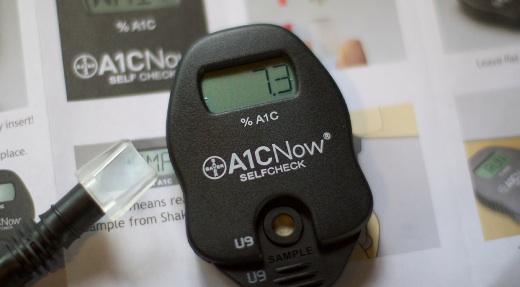The a1c hemoglobin or glycohemoglobin test is a blood test that measures the amount of blood sugar in the body. A1C testing is the preferred diabetes research test and a key component of diabetes management.
According to the National Institute of Diabetes and Digestive and Kidney Diseases, the test works by calculating the level of glucose attachment to hemoglobin and protein in Red Blood Cells (RBC).
The results are usually transmitted in percentages; a normal a1c read in the blood should be below 5.7% or there abouts. This essentially means a person with a higher blood glucose level will have a higher percentage read. A/C testing is also critical because early signs and symptoms of the diabetes disease are very difficult to point out.

How to Lower Hemoglobin a1c
There are many ways of lowering hemoglobin a1c; and these are generally the same methods used for lower blood sugar levels in the body. The magic words, as ever, revolves around the term ‘healthy living’.
According to Madeline Vann, writing for Everyday health.com, you can lower the level of a1c in your body by eating healthy, learning to manage stress or depression, staying physically active, and taking medications as prescribed.
Eating healthy means taking a diet that constitutes lean proteins, dairy products, healthy fats, vegetables, fruits and whole grains (though nowadays the negative effects of whole grains, especially of wheat and maize (corn) also needs to be considered. Regarding the importance of fruits and vegetables, Vann adds that a study performed in 2012, which was published in Plos One, linked the use of fruits and vegetables rich in fiber to better blood sugar management.
So in addition to diet, the main answers to how to lower hemoglobin a1c? include just working out for 30 minutes several days a week, as this has been shown to help put diabetes in check. The most preferred physical exercises involve strength training and aerobics.
Diabetes Management
Learning how to manage diabetes related depression or distress is also critical in the overall fight to reduce the levels of blood sugar.
This form of stress management is necessary because factors such as depression, diabetes burnout, and negative feelings can exasperate and make management of diabetes unattainable.
Medication Used to Lower A1C Levels
Taking medications as prescribed by the doctor also helps in the attainment of a1c test goals. A1C testing plays a major role in preventing and avoiding diabetes. It is instructive to note that elevated levels of a1c can lead to high levels of mortality and morbidity in people with or without diabetes.
A1c testing is vital in many ways, for instance; diagnosis of pre-diabetes and diabetes, prevention of diabetes complications, improvement of diabetes treatment and evaluation of healthy choices. The availability of a1c self-testing saves time and money, and more importantly lives.
However, A1C testing also has its demerits; according to the American diabetes Association, a1c is a poor marker of the critical pathophysiological irregularities that come with diabetes. Diabetes is also clinically described as the presence of high levels of blood sugar and not the glycation of proteins.
Concerning the danger of lowering the levels of blood sugar; there is currently no conclusive evidence that shows lowering the level of blood sugar within acceptable limits can cause harm to the body.
References
National Institute of Diabetes and Digestive and Kidney Diseases and the National Institute of Health (NIH): http://diabetes.niddk.nih.gov/dm/pubs/A1CTest/
Everyday Health: http://www.everydayhealth.com/health-report/type-2-diabetes/lower-a1c-for-diabetes-control.aspx
American Diabetes Association: http://care.diabetesjournals.org/content/34/Supplement_2/S184.full#ref-18

